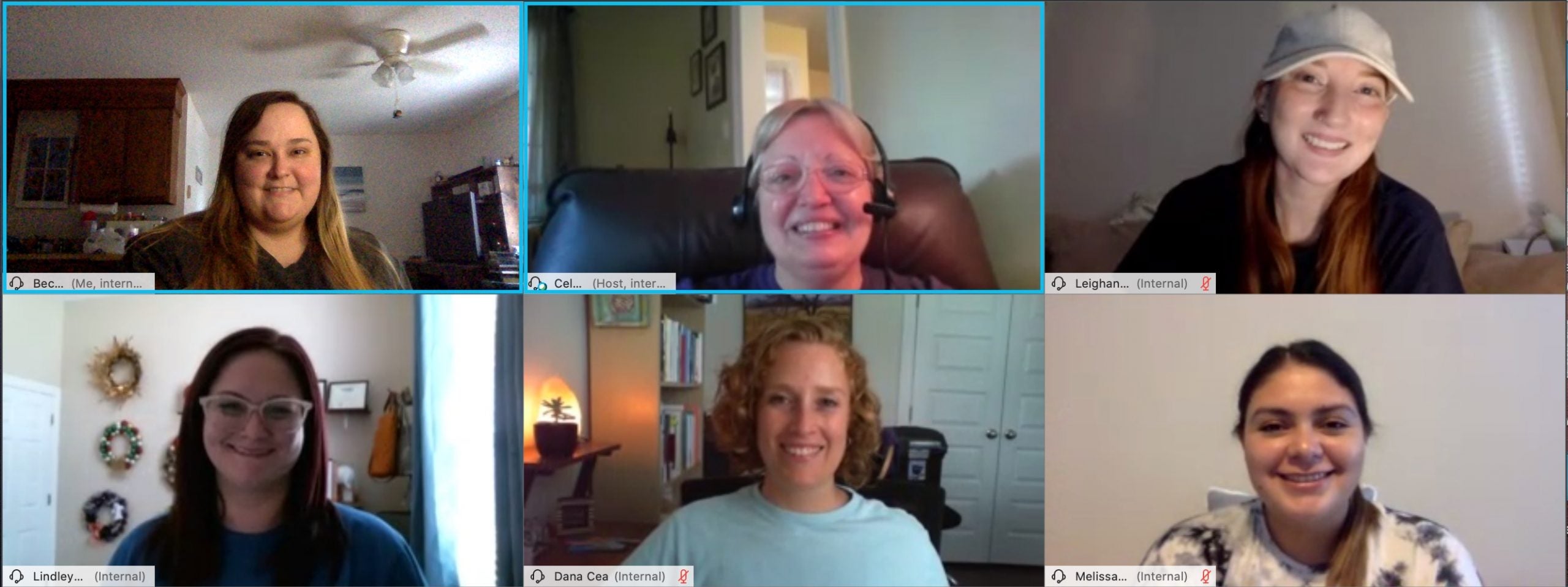MENTAL HEALTH CARE FROM HOME
Navigate Counseling Clinic finds that online appointments provide improved access for clients
FREE MENTAL HEALTH SERVICES
The Navigate Counseling Clinic provides free mental health services for the local community as well as ECU students and employees.
Call Navigate at 252-744-0328 for more information or to schedule an appointment.
As the COVID-19 pandemic has progressed, many of us have been forced into making changes that were previously unimaginable — we’re wearing masks when we leave our homes, holding meetings online, staging drive-by birthday parties and Zoom weddings. Although it’s clear that a lot of the solutions we’ve found aren’t ideal, others we might consider holding onto.
ECU’s Navigate Counseling Clinic has found some of those silver linings as its clinicians transitioned to providing all of its mental health counseling services using WebEx, FaceTime and telephone. Its clinicians say these types of appointments allow them to accommodate their clients’ schedules more easily and to reach some clients who previously had difficulty making it to in-person appointments.
Like other health care providers who have recently implemented new ways to serve patients safely during the pandemic, Navigate — which provides mental health counseling to both the ECU community and the public free of charge — only offered in-person sessions prior to the beginning of the COVID-19 pandemic. In March, as the rest of the university community moved instruction and services online, the Navigate clinic began seeing patients virtually and by phone.

Navigate’s mental health clinicians, shown during one of their regular virtual meetings, have been meeting with their clients and each other via web conferencing and by phone since March. (Contributed photo)
Navigate Director Dr. Celeste Crawford said the clinic will continue to operate virtually for at least the first eight weeks of the new semester, and will likely continue to offer online services even once they begin seeing clients in person again.
“As much as telehealth has its downsides in terms of not having that face-to-face contact with other people,” Crawford said, “(for) people who are maybe a little more reluctant to come in, who have transportation or health issues that might keep them from keeping their regularly scheduled appointment, telehealth has allowed us to expand our resources for them.”
Navigate’s clinicians — who are all doctoral students at least provisionally, if not fully licensed — can now be more flexible with their time because they’re not bound by the requirements of having physical office space available for appointment. Because the clinic also serves as a classroom space within the College of Allied Health Sciences, they were previously limited to scheduling appointments that didn’t conflict with classes, Crawford said.
Virtual appointments can create additional challenges for mental health care providers, who are trained not only to listen to what they’re being told, but also to closely observe body language to gain a better understanding.
“It takes a lot more energy to do telehealth appointments than face-to-face appointments,” Crawford said. “You have to concentrate a lot harder and you’re not getting as much body-language feedback from clients, so you have to ask more questions.”
Mental Health Needs Changing Amid Pandemic
In addition to Navigate’s need to find new methods to meet with patients, some clinicians have found there are more clients, that their clients’ needs have changed and that their own recommendations need to be adjusted as a result of the pandemic as well.
“We’ve seen more people struggling with relapse or fear of relapsing and we’ve seen some people feeling their normal coping mechanisms aren’t available to them — going to the gym or reaching out to a friend if they’re feeling down. So, there’s more depression,” Crawford said. “People who have been able to manage fairly well just need more support. We’ve been talking in our meetings about how some of the things that we normally suggest to people aren’t always available now. We’ve had to find other ways to help people manage.”
PhD candidate Lindley Cherry, a Navigate clinician and a licensed supervisor for those working to become addictions specialists, said that they are seeing more new clients who previously hadn’t been to therapy come in to address concerns. Others though, have benefitted from the recent reduced societal pressure to socialize.
“I’ve seen both, surprisingly,” Cherry said. “There are some where (substance use or temptation to use) has increased, for sure — ‘I’m at home bored all day’ or ‘I lost my job and that triggered me’ — things like that, absolutely. But I’ve also had several who have said that the daily stressors of ‘I don’t like being around people’ or ‘When I go out to go meet someone or do something, it stresses me out, and I would drink or I would do something to cope in order to calm myself down. Now I don’t have those stressors anymore and I’m not drinking.’”
As clients’ needs have changed and clinicians have explored the possibilities within their new online options, Navigate has also begun offering group-based support services, also conducted via WebEx.
“It’s for people who are maybe feeling socially isolated or having difficulty dealing with the new environment that the pandemic has brought on,” Crawford said. “It’s gone very well — people have enjoyed it so much that we’ve added in a second group. The clients have said it’s a nice way to connect with people who are having some of the same fears that they’re having.”
